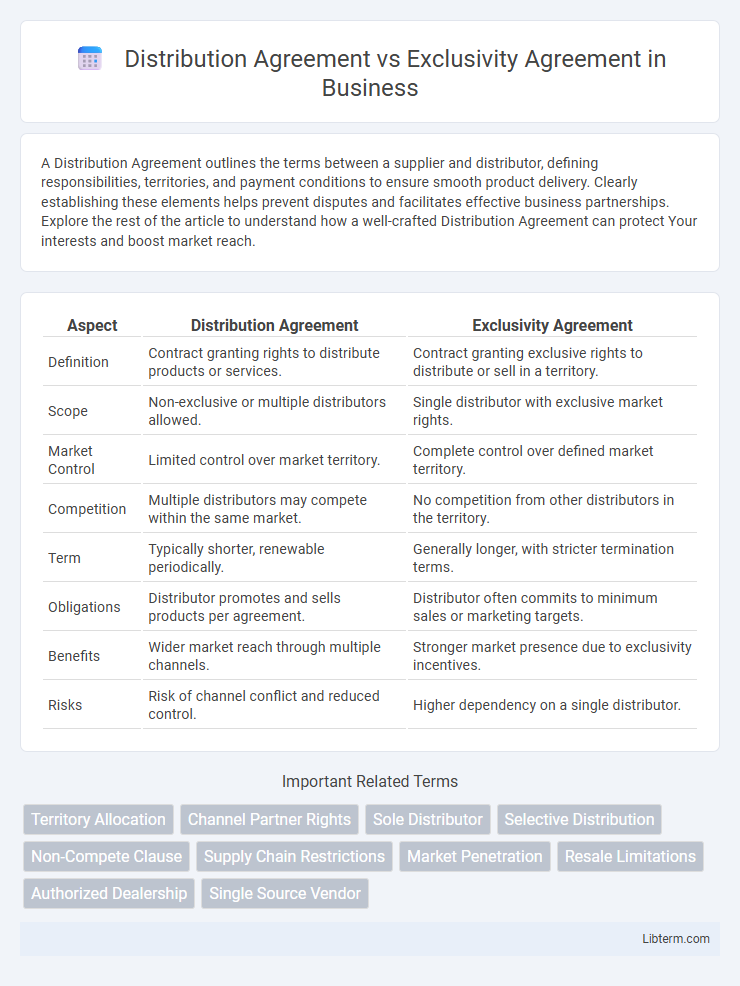A Distribution Agreement outlines the terms between a supplier and distributor, defining responsibilities, territories, and payment conditions to ensure smooth product delivery. Clearly establishing these elements helps prevent disputes and facilitates effective business partnerships. Explore the rest of the article to understand how a well-crafted Distribution Agreement can protect Your interests and boost market reach.
Table of Comparison
| Aspect | Distribution Agreement | Exclusivity Agreement |
|---|---|---|
| Definition | Contract granting rights to distribute products or services. | Contract granting exclusive rights to distribute or sell in a territory. |
| Scope | Non-exclusive or multiple distributors allowed. | Single distributor with exclusive market rights. |
| Market Control | Limited control over market territory. | Complete control over defined market territory. |
| Competition | Multiple distributors may compete within the same market. | No competition from other distributors in the territory. |
| Term | Typically shorter, renewable periodically. | Generally longer, with stricter termination terms. |
| Obligations | Distributor promotes and sells products per agreement. | Distributor often commits to minimum sales or marketing targets. |
| Benefits | Wider market reach through multiple channels. | Stronger market presence due to exclusivity incentives. |
| Risks | Risk of channel conflict and reduced control. | Higher dependency on a single distributor. |
Understanding Distribution Agreements
A Distribution Agreement defines the terms under which a distributor is authorized to sell or promote a manufacturer's products, often specifying territories, pricing, and responsibilities. This contract ensures clear guidelines on product availability, delivery schedules, and payment terms, facilitating smooth supply chain operations. Understanding these agreements helps businesses optimize market reach while maintaining control over brand representation and sales strategies.
What is an Exclusivity Agreement?
An Exclusivity Agreement is a contract where one party grants another the sole right to distribute, sell, or represent a product or service within a specific territory or market. This agreement restricts the supplier from engaging with other distributors or sellers during the term, ensuring exclusive market access for the appointed party. By securing exclusivity, businesses can build stronger partnerships and potentially increase market control and brand loyalty.
Key Differences Between Distribution and Exclusivity Agreements
Distribution agreements outline the terms under which a distributor sells products on behalf of a supplier, often allowing multiple distributors to operate within the same territory. Exclusivity agreements grant exclusive rights to a single distributor or partner, preventing the supplier from engaging other parties in the designated market or territory. Key differences include the scope of market access, competition restrictions, and the level of commitment required from both parties.
Legal Definitions and Interpretations
A Distribution Agreement legally outlines the terms under which a distributor sells a supplier's products, specifying rights, responsibilities, and territorial scope without necessarily limiting sales to a single distributor. An Exclusivity Agreement creates a binding legal obligation granting one party exclusive rights to sell or distribute products within a defined market or territory, restricting the supplier from engaging other distributors. Courts interpret Distribution Agreements based on contract terms and intent, while Exclusivity Agreements often invoke stricter scrutiny due to potential competition limitations and antitrust considerations.
Benefits of Distribution Agreements
Distribution agreements enhance market reach by allowing suppliers to leverage established distribution networks, increasing product availability and sales volume. These agreements often reduce operational costs by transferring logistics and marketing responsibilities to the distributor. Unlike exclusivity agreements, distribution agreements provide flexibility for manufacturers to partner with multiple distributors, fostering competitive pricing and broader market penetration.
Advantages of Exclusivity Agreements
Exclusivity agreements provide businesses with a competitive edge by granting sole distribution rights, fostering stronger brand loyalty and market control. These agreements often result in increased investment from distributors due to guaranteed market exclusivity, driving enhanced promotional efforts and better alignment with brand strategies. By limiting competition within assigned territories or channels, exclusivity agreements help in stabilizing pricing and improving long-term revenue predictability.
Risks and Limitations of Each Agreement
Distribution agreements often pose risks such as limited control over the distributor's market activities and potential conflicts with other distributors, leading to diluted brand presence and inconsistent customer experiences. Exclusivity agreements carry significant limitations, including reduced market reach and dependency on a single partner, which can result in decreased negotiating power and vulnerability if the exclusive distributor underperforms or breaches the contract. Both agreements require careful risk assessment regarding territorial restrictions, termination clauses, and compliance with competition laws to avoid legal disputes and financial losses.
Choosing the Right Agreement for Your Business
Selecting the appropriate agreement depends on your business goals and market strategy; a Distribution Agreement allows multiple distributors to sell your products, fostering wider market reach, while an Exclusivity Agreement limits distribution to a single partner, enhancing brand control and stronger partnership commitment. Understanding factors like target audience, competitive landscape, and desired level of control is essential in making the right choice. Evaluating the trade-offs between market penetration and exclusivity impact ensures alignment with your long-term business objectives.
Common Clauses in Distribution vs Exclusivity Contracts
Distribution agreements commonly include clauses on territory, product scope, pricing, payment terms, delivery, and termination rights to define the seller-distributor relationship clearly. Exclusivity agreements typically emphasize exclusive rights granted to one party for sales or distribution within a specified market, alongside performance obligations, non-compete provisions, confidentiality, and duration of exclusivity. Both contract types often contain clauses on intellectual property usage, dispute resolution, and liability limitations to protect involved parties.
Frequently Asked Questions on Distribution and Exclusivity Agreements
Distribution agreements define the terms under which a distributor markets and sells a supplier's products, specifying territory, duration, and responsibilities, whereas exclusivity agreements limit the supplier or distributor to deal only with specified parties, enhancing market control but restricting competition. Frequently asked questions often address the scope of exclusivity, duration, termination conditions, territorial rights, and obligations for marketing and sales efforts. Understanding key differences in legal enforcement, risk allocation, and performance expectations is crucial for businesses deciding between these contract types.
Distribution Agreement Infographic

 libterm.com
libterm.com